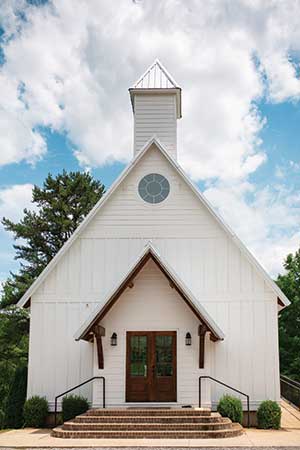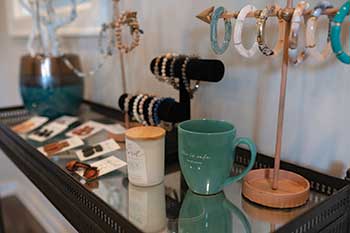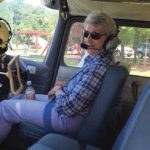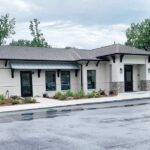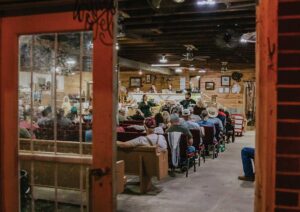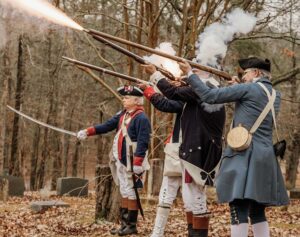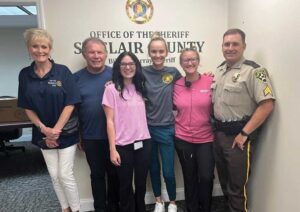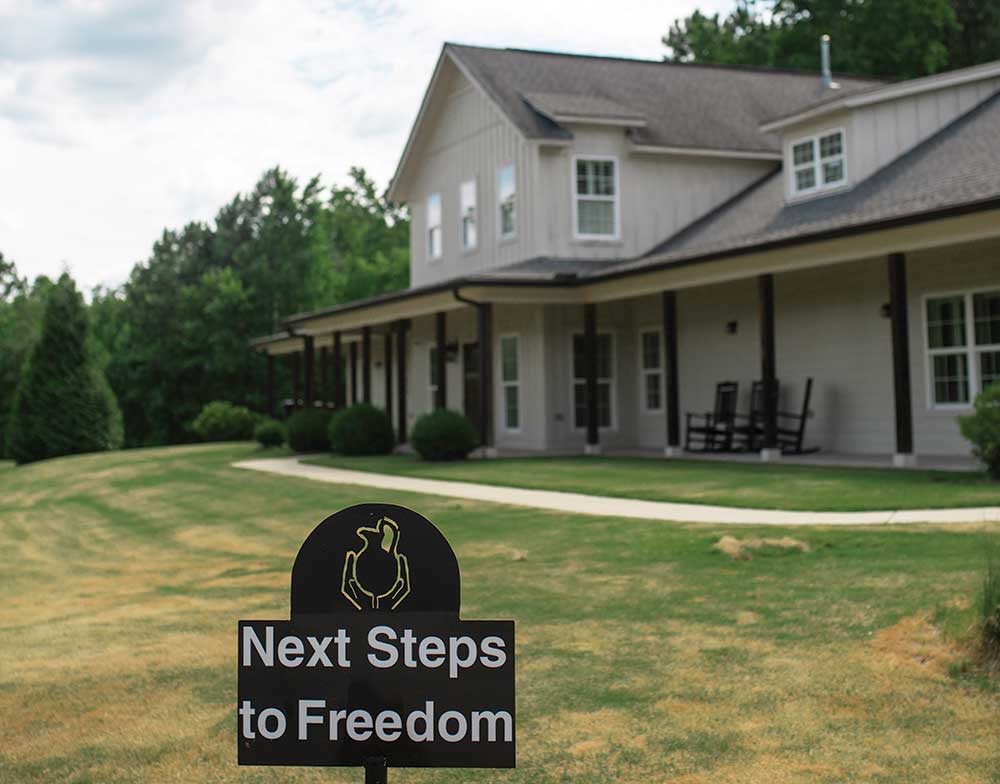
The WellHouse expands facilities to help rebuild lives torn apart by human trafficking.
Story by Roxann Edsall
Photos by Mandy Baughn
There’s a harvest housed in a brand-new barn in Odenville. It’s hardly the typical crop; this one is life changing. From seeds of love and stability are grown a harvest of hope. Simply called “the barn,” the 3,600-square-foot facility is part of The WellHouse, a safe-house campus in St. Clair County for female survivors of human trafficking.
The barn is the new home for ShopWell, the work therapy program run by residents of The WellHouse. The ShopWell program, which provides job training in a safe environment as the survivors work to create and sell hand-crafted items, had outgrown their small working space in the administration building. As part of the year-long program offered at The WellHouse, residents are employed to make jewelry, clay dishes, candles, wood products, leatherwork and quilts.
The new space offers room to create items and provides a small shop where volunteers and invited supporters can purchase items. ShopWell items can also be purchased through their online store. Within a year, they hope to have an off-campus brick and mortar store.
As ShopWell associates, these survivors, many of whom have never held a job for which they received compensation, learn about work culture by submitting employment applications, following work schedules and functioning as part of a work team.
The opportunity to create is also a part of the recovery process. “I love working with my hands to create something that is beautiful,” says Ava, a graduate of The WellHouse program, now serving as coordinator of the ShopWell program. “Working on beautiful things here is where my creativity came back to life.”
Ava smiles as she talks about the program that has changed her life. Despite having endured the horrors of human trafficking for more than 30 years, she is healing and has a new vision for her life. She has chosen the name Ava over her given name as a symbol of the beginning of her life in freedom.
For Ava, the nightmare began as one of her earliest memories at the age of three. Over the next 30 years, the trafficking continued. She was able to escape twice but was re-exploited both times by people in agencies she thought would protect her. “I went to them for help, but they were not who they said they were,” she recalls.
Eventually, she escaped again and fled to another country and looked for ways to help others still stuck in human trafficking situations. As part of her effort to help others, she returned to the U.S. to participate in an anti-trafficking conference.
It was in her efforts to help others that she realized how much healing she still had to do. After a month in a safe house in Ohio, she entered the program at The WellHouse. “I knew I needed to find healing myself in order to be able to help other survivors,” recounts Ava.
Her story of healing is still being written. She has since graduated from the year-long program and has moved into the Next Steps to Independence apartments on the 63-acre WellHouse campus. She has a car and is working on a degree in Psychology, something she hopes to use to help others. “At this point, I feel like I can start planning a future,” says Ava, beaming. “I have a broad vision but taking baby steps right now.”
For now, Ava is happy in her role as ShopWell coordinator. “Working with the ladies in ShopWell is healing for them and just as much for me,” she adds. “The biggest thing I’ve learned is how to walk in gratitude and not be offended at what life has been like. For me, that’s the key to learning to trust and to hope for the future.”
Learning to trust again is a mountain that survivors don’t conquer easily. Trauma-therapy is a big part of that recovery, and new individual therapy offices are now open on the second floor of the Barn, along with group therapy space and exercise options for residents. There are four therapists and four case managers on staff at The WellHouse to help them through the journey to healing and restoration.
“Through each one of these committed staffers, our residents have opportunities for healing,” says Carolyn Potter, CEO of The WellHouse. “These ladies who come to us seem to have an extra measure of resilience in them.
“We know from doing trainings that there is still a mindset that people who are prostituting want to do it for the money or for drugs,” continues Potter. “What we say is that if you look deeper, you will likely find there was childhood sexual abuse. That was the beginning of her trauma, her vulnerability to the tragedies of her life. The deeper we get into her therapy, we find there was someone who controlled her.”
Ava has worked hard to regain control of her own life. That resilience is what helped her work through the desperate isolation and hopelessness that characterized her life as a victim of human trafficking, a terrible journey that began as a small girl trafficked by a family member.
A 2020 report from Polaris Project, a nonprofit that works to combat sex and labor trafficking in North America, shows that victims usually know and trust their traffickers. Forty two percent of human trafficking victims are brought into trafficking by a member of their own family.
The WellHouse facility has been open for seven years and is currently working with 34 survivors. The 501c3 organization partners with many other agencies to provide information and advocacy for survivors.
They are a provider partner for the Alabama Anti Human Trafficking Alliance, a statewide initiative funded by a grant from the U.S. Department of Justice. In that role, they serve as a frontline resource for survivors identified by the Alliance, offering crisis services, stabilization, restoration and support toward independent living.
Some of The Wellhouse partner agencies are Safe House Project, Rescue America, Homeland Security, UAB, Trafficking Hope, End It Alabama and Children’s Hospital.
These national and state agencies recognize that while the numbers of cases of human trafficking are lower in Alabama than in many states, Alabama is not immune to this epidemic. According to the FBI crimes database, National Incident-Based Reporting System (NIBRS), there were 36 human trafficking offenses reported in Alabama in 2022, the latest year reported in the system. That’s up from 21 cases in 2021. In over half of those cases, the victims were under the age of 18.
The WellHouse saw the growing need and, three years ago, opened a building with a program to serve minor girls, ages 11 to 18. The facility is currently serving six youths with a waiting list of others needing placement.
This past May, 47 people were arrested in connection with human trafficking cases in Tuscaloosa and Shelby counties. Though there have been no reported cases in St. Clair County, those who work in rescue organizations acknowledge that some cases go unreported or are classified as prostitution or drug-related crimes.
Gov. Kay Ivey signed new legislation called the Sound of Freedom Act in April, which she said positioned Alabama as the state with the “toughest punishment for anyone who is found guilty of first-degree human trafficking of a minor.” Effective Oct. 1, anyone convicted of trafficking a minor in Alabama will face a mandatory minimum sentence of life in prison.
Human trafficking is the second most profitable illegal industry in the world, according to the International Labour Organization, second only to the drug trade, but is the fastest growing.
Citizens can help. A survivor’s rescue story often involves another person reporting to police something that just doesn’t seem right. “Don’t assume someone else will see what you see,” Ava says. “Be willing to take a risk to help.”
St. Clair County is home to a place that is helping these survivors reclaim their lives and their futures. Supported by contributions from individuals, civic and religious organizations, non-profits, foundations and government programs for crime victims, The WellHouse is an organization which provides a peaceful residential therapy program that is making a difference one shattered life at a time.
“The best thing about the program at The WellHouse? Being loved unconditionally,” says Ava. “You finally have someone in your life who is a constant, who stays with you the whole time and loves you. Then you can begin to see the worth they see in you.” That’s a bountiful harvest … a harvest of hope, putting together the pieces of a life torn apart by human trafficking.
Editor’s Note: To report suspected human trafficking, contact toll-free (24/7) the National Human Trafficking Hotline at 1-888-373-7888 or text HELP to BeFree (233733). Additional resources are at: www.enditalabama.org for information on human trafficking;www.the-wellhouse.org to learn more about or to volunteer at The WellHouse; and www.shopwell-wellhouse.org to purchase from ShopWell.











